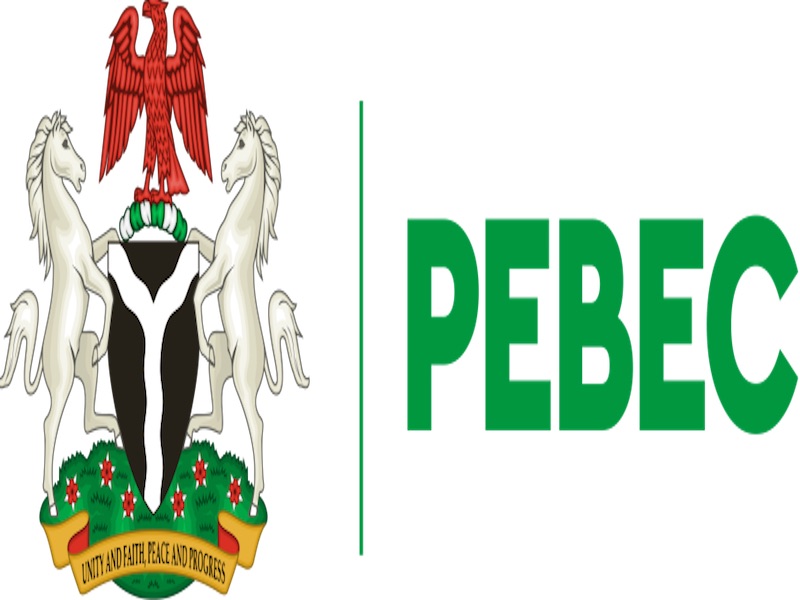News
PEBEC commences fourth 60-Day National Action Plan on Ease of Doing Business

In line with the commitment to deliver reforms aimed at improving the enabling environment for doing business in Nigeria through systemic interventions, the Presidential Enabling Business Environment Council (PEBEC) has commenced the fourth 60-day National Action Plan (NAP 4.0) on Ease of Doing Business (EoDB).
The NAP 4.0, which will run from the 1st of March to the 29th of April, 2019 aims to further reduce the challenges encountered by SMEs and businesses in identified areas of focus such as starting a business, getting credit, paying taxes, enforcing contracts or trading within and across borders, amongst others, by eliminating critical bottlenecks and constraints to doing business in Nigeria.
The first, second and third National Action Plans on Ease of Doing Business, which were coordinated by Enabling Business Environment Secretariat (EBES) of the Council, have resulted insignificant progress over the past 3 years. Working in collaboration with the ministries, departments and agencies (MDAs), the fourth National Action Plan is anticipated to strengthen these ongoing reforms, and improve the Ease of Doing Business frameworks adopted.
Some of the targets achieved in NAP 3.0include driving registration for utilization of the National Collateral Registry to facilitate access to credit for SMEs; clearance of all pending NAFDAC registration applications to improve efficiency; and creation of a strengthened single joint cargo examination interface in all airports & seaports for import and export to reduce the time spent at the ports.
In a statement by the Honourable Minister for Industry, Trade & Investment and line minister for the intervention, Dr. Okey Enelamah, he stated: “The NAP 4.0 has been launched to deepen the reforms delivered and drive institutionalization. We have highlighted key action items in each of the focus areas to ensure the reforms delivered do not unravel, and to ensure we drive sustainability.
Also speaking on the commencement, the PEBEC Secretary and Senior Special Assistant to the President on Industry, Trade & Investment, Dr. Jumoke Oduwole said: “The Council will continue to work extensively with all MDAs, the National Assembly and various arms of government on various reforms critical to an enabling business environment .For the NAP 4.0, these include targets such as enforcing compliance with SLAs across all focus areas, driving the passage of the CAM Bill 2018 for improved effectiveness of company law in Nigeria, enhancing efficiency in the small claims court, and enhancing the application and approval system for visas on arrival, to mention a few.
She further stated: “We will also engage public and private sector stakeholders, and intensify efforts to communicate the reforms to ensure the benefits are realised. We have already started a number of communication initiatives, including setting up a website for access to all information on all reforms at www.businessmadeeasy.ng”
PEBEC was established in 2016 to oversee Nigeria’s business climate reform agenda, and is Chaired by His Excellency the Vice President, Prof. Yemi Osinbajo, SAN,with the Honourable Minister of Industry, Trade and Investment, DrOkey Enelamah as Vice Chair. PEBEC’s model aligns with global best practice and includes a strong performance tracking element that is measured by the World Bank Ease of Doing Business Index (DBI), which is reported annually.
News
Tech Executives Double Down on AI, Talent and Adaptive Strategies to Lead in the Intelligence Age

KPMG’s Global Tech Report 2026 reveals that organisations worldwide are moving beyond pilots and seeking to embed AI into core workflows and offerings, striving to scale investments. The new report identifies that while expectations are high and adoption is rapid; scaling can introduce additional complexity and returns vary widely.

- 68 percent of organisations surveyed aim to reach the highest level of AI maturity by the end of 2026, yet only 24 percent are there today.
- 88 percent are investing in building agentic AI into their systems.
- 74 percent say their AI use cases are delivering business value, but only 24 percent achieve ROI across multiple use cases.
- 90 percent plan to grow partnerships and tech ecosystems over the next year, yet 53 percent still lack the talent needed to bring their digital transformation plans to life.
- 78 percent agree they must take more risks on emerging technologies to stay relevant.
The report asks: Can ambition match reality, and can organisations keep one eye on the next wave of innovation while delivering on today’s agenda?
“The future belongs to leaders who turn intelligence into advantage. Our research shows organisations are pushing past the early phase of ‘AI roulette’, placing scattered bets on multiple technologies, and are now increasingly focused on delivering value. When ambition meets disciplined execution, value compounds.
“Our 2026 Global Tech Report provides a synopsis of the critical things that high performers are doing better than most; a checklist for tech leaders looking to improve their organisational performance, emulate the high performers, and deliver higher ROI”. – Guy Holland, Global Leader, CIO Center of Excellence, KPMG International
”As Africa enters the Intelligence Age, the differentiator is no longer access to technology, but the ability to build the skills, governance, and operating models required to scale it responsibly. While organisations are accelerating AI adoption to drive productivity and growth, the real determinant of value lies in workforce readiness, executive alignment, and disciplined execution.
Those that invest early in digital skills, human-AI collaboration, and adaptive leadership will be best positioned to translate innovation into sustainable commercial and economic impact.” – Marshal Luusa, Partner: Technology & Innovation Lead, KPMG One Africa
Key findings from the report
Tech maturity accelerates: Leaders set their sights on the top
Half (50 percent) of global tech leaders surveyed expect to reach the highest level of technology maturity in 2026, compared to only 11 percent today. This surge in optimism is fuelled by a move from isolated experiments to integrating AI and advanced technologies into core systems and scaling their impact.
High performers, those organisations leading in technology maturity, process maturity and value, are already reaping the rewards, reporting an average ROI of 4.5x, more than double the industry average of 2x. These leading organisations have progressed beyond pilot programs, prioritising the scaling of innovation and continually adapting to maintain a competitive edge in a fast-evolving environment.
Other organisations reporting higher ROI include smaller firms (3.6x), those with fewer cost pressures (2.6x), and transformation‑focused organisations (3.2x). The ROI pattern is equally nuanced: rather than a single investment ‘sweet spot’, clear ROI ‘zones’ emerge, from early quick wins to accelerating, enterprise‑wide value as maturity increases.
The age of agentic: AI adoption surges but innovation drives real business value
AI is now seen as a strategic necessity, not just industry hype. Sixty-eight percent of respondents are aiming for the highest level of AI maturity in their organisations. Eighty-eight percent of companies are already investing in agentic AI – autonomous digital agents transforming operations and decision-making. Seventy-four percent of respondents report that their AI initiatives are creating measurable business value, such as improved efficiency and reduced risk.
However, only 24 percent say they are scaling AI and achieving ROI across multiple use cases. This highlights the need for organisations to evolve KPIs beyond traditional financial and productivity metrics and build enterprise-wide alignment to fully realise AI’s potential.
The shift from AI experimentation to large-scale deployment is underway, with leaders working to embed AI into products, services, and value delivery.
Talent and agility power success: Human potential remains central
Human expertise remains central to digital transformation initiatives. Organisations are making significant investments in upskilling their workforce, building adaptive teams, and fostering cultures that embrace change.
Despite the rapid adoption of agentic AI, organisations still expect 42 percent of their tech workforce to remain permanent human staff by 2027 – only a five‑point drop from 2025.
High-performing companies plan to retain even more permanent human talent, with 50 percent remaining in place by 2027, revealing the continued importance of human expertise alongside AI. Despite these efforts, 53 percent of organisations report they still lack the talent needed to realise their digital transformation strategies.
Ninety-two percent of organisations surveyed anticipate that managing AI agents will become a critical skill within five years. The most successful organisations prioritise both technological advancements and people, empowering employees to innovate and adapt.
Strategic partnerships fuel growth: Ecosystems expand for the future
To overcome challenges and accelerate learning, 90 percent of organisations plan to grow partnerships and tech ecosystems over the next year. Strategic alliances are enabling access to specialised expertise, rapid innovation, and shared best practices.
As agentic AI and other advanced technologies become mainstream, organisations recognise the importance of building robust ecosystems that foster co-creation and continuous improvement. Nearly one-third of tech executives are planning to increase investment in centers of excellence, supporting cross-functional teams and controlled experimentation.
Preparing for tomorrow’s breakthroughs: Leaders embrace bold risks
The future is arriving fast, with quantum computing and Artificial Superintelligence (ASI) on the horizon. Leaders are already preparing for these breakthroughs, with 78 percent of organisations agreeing they must take more risks on emerging technologies to stay relevant.
The report urges organisations to maintain strategic foresight, invest in ethical frameworks, and build resilient, future-ready workforces. By balancing ambition with rational thinking and disciplined execution, tech executives are positioning their organisations to turn disruption into durable, compounding value.
News
LIRS to Invoke NTAA to Recover Unpaid Taxes from Bank Accounts, Others

Lagos Internal Revenue Service (LIRS) pursuant to Section 60 of the Nigeria Tax Administration Act (NTAA), plans to ask Nigerian banks to debit bank accounts of employers who failed to remit tax liability.

This was disclosed in a recent notice on Sunday.
LIRS stressed that the move was in line with the implementation of the country’s NTAA and other new tax laws, which took effect on January 1, 2026.
“Where a taxpayer fails, neglects, or refuses to settle any established outstanding tax liability when due, LIRS may exercise its power under Section 60 to direct any of the following persons to pay the amount owed by the taxpayer:
“Banks and other financial institutions; Employers; tenants, debtors, or customers of the taxpayer; Agents, business partners, and any person holding money on behalf of the taxpayer; Any person owing money to the taxpayer, whether presently due or accruing. Once a substitution notice is issued, the person served is statutorily required to remit to LIRS the amount. Specified in the notice from funds belonging to, or payable to, the defaulting taxpayer,” the LIRS notice partly read.
Meanwhile, Taiwo Oyedele, chairman of the Presidential Committee on Fiscal Policy and Tax Reforms, weeks ago ruled out claims that the government would debit personal accounts over tax remittances.
News
Anambra Cuts Monday Pay to Kill Sit-at-Home

Anambra State will implement pro-rata salary payments for civil servants starting February 2026, targeting chronic Monday absenteeism from the long-running sit-at-home order, Information Commissioner Dr. Law Mefor announced Saturday.

Soludo
Speaking at an Awka briefing after the Executive Council’s end-of-tenure retreat, Mefor said improved security and transport have eliminated excuses for the four-year disruption, which cost the state trillions in lost revenue. “Workers enjoyed full pay despite staying away; now, no work means no pay for that day, calculated over 24 working days,” he stated.
Compliance measures include mandatory Monday clock-in forms, with markets urged to reopen fully amid bolstered security. This builds on a January 22 executive order docking 20% pay from teachers absent on Mondays.
Mefor warned that lost Mondays cripple revenue collection and productivity, rejecting alternatives like Saturday shifts as capitulation to agitators.

 News1 day ago
News1 day agoAnambra Cuts Monday Pay to Kill Sit-at-Home

 E-Financial1 day ago
E-Financial1 day agoFirst Asset Management Receives Upgraded Ratings from Agusto &Co and DataPro

 General News1 day ago
General News1 day agoNigeria Treats Religious Violence as Attack on State – NSA Ribadu

 E-Financial1 day ago
E-Financial1 day agoCBN Prepares Fresh Debit Card Rules to Improve ATM Services

 E-Financial1 day ago
E-Financial1 day agoNIBSS, Others Flag 13,417 Nigerian Fraudsters on Person of Interest Portal

 News1 day ago
News1 day agoLIRS to Invoke NTAA to Recover Unpaid Taxes from Bank Accounts, Others

 E-Financial4 hours ago
E-Financial4 hours agoNIBBS to Boost Financial Inclusion with Offline Payment Solutions

 E-Business4 hours ago
E-Business4 hours agoFirm Identifies AI as Common Denominator in Entertainment Industry’s 2026 Security Threats




















